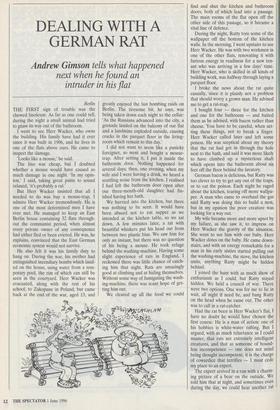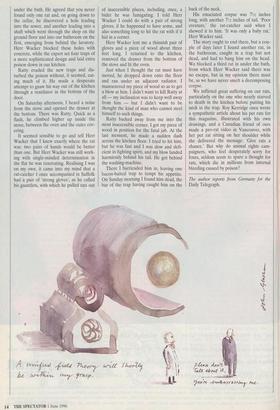DEALING WITH A GERMAN RAT
Andrew Gimson tells what happened
next when he found an intruder in his flat
Berlin THE FIRST sign of trouble was the chewed linoleum. As far as one could tell, during the night a small animal had tried to gnaw its way out of the bathroom.
I went to see Herr Wacker, who owns the building. His family have had it ever since it was built in 1906, and he lives in one of the flats above ours. He came to inspect the damage.
'Looks like a mouse,' he said.
The lino was cheap, but I doubted whether a mouse would have caused so much damage in one night. 'In my opin- ion,' I said, taking great pains to sound relaxed, 'it's probably a rat.'
But Herr Wacker insisted that all I needed to do was buy a mouse-trap. I admire Herr Wacker tremendously. He is one of the most determined men I have ever met. He managed to keep an East Berlin house containing 32 flats through- out the communist period, when almost every private owner of any consequence had either fled or been evicted. He was, he explains, convinced that the East German economic system would not survive.
He also felt it was his family duty to hang on. During the war, his mother had extinguished incendiary bombs which land- ed on the house, using water from a tem- porary pool, the rim of which can still be seen in the courtyard. Herr Wacker was evacuated, along with the rest of his school, to Zakopane in Poland, but came back at the end of the war, aged 13, and greatly enjoyed the last bombing raids on Berlin. The tiresome bit, he says, was being taken down each night to the cellar: 'As the Russians advanced into the city, a grenade landed on the balcony of our flat and a landmine exploded outside, causing cracks in the parquet floor in the living- room which remain to this day.'
I did not want to seem like a panicky foreigner, so went and bought a mouse- trap. After setting it, I put it inside the bathroom door. Nothing happened for several days; then, one evening, when my wife and I were having a drink, we heard a scuttling noise from the kitchen. I realised I had left the bathroom door open after our three-month-old daughter had fin- ished having her bath.
We hurried into the kitchen, but there was nothing to be seen. It would have been absurd not to eat supper as we intended at the kitchen table, so we sat down. A few minutes later, a rat with beautiful whiskers put his head out from between two plastic bins. We saw him for only an instant, but there was no question of his being a mouse. He took refuge behind the washing-machine. Having some slight experience of rats in England, I reckoned there was little chance of catch- ing him that night. Rats are amazingly good at climbing and at hiding themselves. Without some way of fumigating the wash- ing-machine, there was scant hope of get- ting him out. We cleared up all the food we could find and shut the kitchen and bathroom doors, both of which lead into a passage. The main rooms of the flat open off the other side of this passage, so it became a vital line of defence.
During the night, Ratty tore some of the wallpaper off the bottom of the kitchen walls. In the morning, I went upstairs to see Herr Wacker. He was with two workmen in one of the other flats, renovating it with furious energy in readiness for a new ten- ant who was arriving in a few days' time. Herr Wacker, who is skilled in all kinds of building work, was halfway through laying a parquet floor.
I broke the news about the rat quite casually, since it is plainly not a problem that should worry a grown man. He advised me to get a rat-trap.
I bought four — three for the kitchen and one for the bathroom — and baited them as he advised, with bacon rather than cheese. You have to be careful, when set- ting these things, not to break a finger. Herr Wacker called later and left some poison. He was sceptical about my theory that the rat had got in through the hole next to the bath, and said it was more likely to have climbed up a mysterious shaft which opens into the bathroom about six feet off the floor behind the lavatory.
German bacon is delicious, but Ratty was too clever to try to get any out of the traps, or to eat the poison. Each night he raged about the kitchen, tearing off more wallpa- per. A man who came to overhaul the gas said Ratty was doing this to build a nest, but in my opinion the poor creature was looking for a way out.
My wife became more and more upset by my failure, as she saw it, to impress on Herr Wacker the gravity of the situation. She went to see him with our baby. Herr Wacker dotes on the baby. He came down- stairs, and with an energy remarkable for a man in his early sixties started pulling out the washing-machine, the stove, the kitchen units, anything Ratty might be hidden behind.
I joined the hunt with as much show of enthusiasm as I could, but Ratty stayed hidden. We held a council of war. There were two options. One was for me to lie in wait, all night if need be, and bang Ratty on the head when he came out. The other was to call in a rat-catcher.
Had the rat been in Herr Wacker's flat, I have no doubt he would have chosen the first course. He is a man of action: one of his hobbies is white-water rafting. But I argued, with as much reluctance as I could muster, that rats are extremely intelligent creatures, and that as someone of bound- less incompetence — one does not mind being thought incompetent, it is the charge of cowardice that terrifies — I must cede my place to an expert.
The expert arrived in a van with a charm- ing picture of a bear on the outside. We told him that at night, and sometimes even during the day, we could hear another rat under the bath. He agreed that you never found only one rat and, on going down to the cellar, he discovered a hole leading into the sewer, and another leading into a shaft which went through the shop on the ground floor and into our bathroom on the first, emerging from behind the lavatory. Herr Wacker blocked these holes with concrete, while the expert set four traps of a more sophisticated design and laid extra poison down in our kitchen.
Ratty evaded the new traps and dis- turbed the poison without, it seemed, eat- ing much of it. He made a desperate attempt to gnaw his way out of the kitchen through a ventilator in the bottom of the door.
On Saturday afternoon, I heard a noise from the stove and opened the drawer at the bottom. There was Ratty. Quick as a flash, he climbed higher up inside the stove, between the oven and the outer cov- ering.
It seemed sensible to go and tell Herr Wacker that I knew exactly where the rat was: two pairs of hands would be better than one. But Herr Wacker was still work- ing with single-minded determination in the flat he was renovating. Realising I was on my own, it came into my mind that a rat-catcher I once accompanied in Suffolk had a pair of 'strong gloves', as he called his gauntlets, with which he pulled rats out of inaccessible places, including, once, a bidet he was fumigating. I told Herr Wacker I could do with a pair of strong gloves, if he happened to have some, and also something long to hit the rat with if it hid in a corner.
Herr Wacker lent me a thinnish pair of gloves and a piece of wood about three feet long. I returned to the kitchen, removed the drawer from the bottom of the stove and lit the oven.
Just when I thought the rat must have moved, he dropped down onto the floor and ran under an adjacent radiator. I manoeuvred my piece of wood so as to get a blow at him. I didn't want to kill Ratty at all — my inclination was to keep well away from him — but I didn't want to be thought the kind of man who cannot steel himself to such things.
Ratty backed away from me into the most inaccessible corner. I got my piece of wood in position for the fatal jab. At the last moment, he made a sudden dash across the kitchen floor. I tried to hit him, but he was fast and I was slow and defi- cient in fighting spirit, and my blow landed harmlessly behind his tail. He got behind the washing-machine.
There I barricaded him in, leaving one bacon-baited trap to tempt his appetite. On Sunday morning I found him dead, the bar of the trap having caught him on the back of the neck.
His emaciated corpse was 71/2 inches long, with another 71/2 inches of tail. 'Poor creature,' the rat-catcher said when I showed it to him. 'It was only a baby rat,' Herr Wacker said.
The story ought to end there, but a cou- ple of days later I found another rat, in the bathroom, caught in a trap but not dead, and had to bang him on the head. We blocked a third rat in under the bath, from which Herr Wacker said there was no escape, but in my opinion there must be, as we have never smelt a decomposing corpse.
We inflicted great suffering on our rats, particularly on the one who nearly starved to death in the kitchen before putting his neck in the trap. Roy Kerridge once wrote a sympathetic article about his pet rats for this magazine, illustrated with his own drawings, and a Canadian friend of ours made a pro-rat video in Vancouver, with her pet rat sitting on her shoulder while she delivered the message: 'Give rats a chance.' But why do animal rights cam- paigners, who feel desperately sorry for foxes, seldom seem to spare a thought for rats, which die in millions from internal bleeding caused by poison?
The author reports from Germany for the Daily Telegraph.



























































 Previous page
Previous page